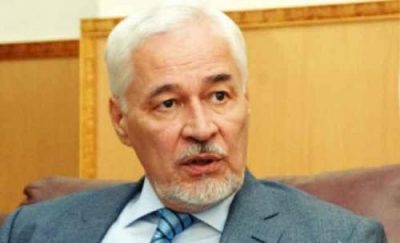Russian Ambassador to Sudan Found Dead, Drowned in Own Pool. Ninth Russian Diplomat who has Died in the Past Year

Featured image: Ambassador of the Russian Federation to the Republic of Sudan, Mirgayas M. Shirinskiy
Eight months after the Russian ambassador to Turkey, Andrei Karlov, was shot dead in broad daylight, on Wednesday yet another Russian ambassador has died. According to Russian news agency RIA Novosti, the Ambassador of the Russian Federation to the Republic of Sudan, Mirgayas M. Shirinskiy, was found dead in his home in Khartoum Wednesday.
Al Arabiya adds that the ambassador was found drowned in the swimming pool at his home.
Employees of the embassy discovered Shirinsky at his residence around 6pm local time, the press secretary of the Sudan mission, Sergey Konyashin, according to RT. The diplomat, who was 62 years old, appeared to have symptoms consistent with a serious heart seizure, Konyashin said, adding that doctors were immediately called to the scene, but were unable to save his life.

Russian embassy in Khartoum
According to Sputnik, before taking his post in Sudan, Shirinskiy served at the Russian embassies in Egypt, Yemen, Saudi Arabia and Rwanda. The diplomat’s body was taken to a morgue in a Khartoum hospital, the spokesman said, adding that procedures are now in place to arrange for its return to Russia.
The Russian Foreign Ministry confirmed the death:
“We inform you with regret that Russian Ambassador to Sudan Mirgayas Shirinsky died in Khartoum on August 23,” the Russian ministry said. “Immediately after receiving detailed information from employees at the Russian embassy in Khartoum, we will inform you about the circumstances of our colleague’s death,” the ministry said.
The Sudanese Ministry of Foreign Affairs also praised Shirinskiy’s “friendly and sincere efforts to develop relations between the two countries and their peoples in various fields.”
The death of Shirinskiy marks the 9th Russian diplomat who has died in the past year. Here is a list of the more prominent recently deceased Russian diplomats:
- Sergei Krivov, 63, a Russian diplomat at the Russian Consulate in New York was found dead on November 8. Krivov served as duty commander involved with security affairs, according to Russian news reports
- Russia’s Ambassador to Turkey, Andrei Karlov — assassinated by a police officer at a photo exhibit in Ankara on December 19.
- On the same day, another diplomat, Peter Polshikov, was shot dead in his Moscow apartment. The gun was found under the bathroom sink but the circumstances of the death were under investigation. Polshikov served as a senior figure in the Latin American department of the Foreign Ministry.
- Russia’s Ambassador to the United Nations, Vitaly Churkin, died in New York in May. Churkin was rushed to the hospital from his office at Russia’s UN mission. Initial reports said he suffered a heart attack, and the medical examiner is investigating the death, according to CBS.
- Russia’s Ambassador to India, Alexander Kadakin, died after a “brief illness January 27, which The Hindu said he had been suffering from for a few weeks.
- Russia’s Consul in Athens, Greece, Andrei Malanin, was found dead in his apartment January 9. A Greek police official said there was “no evidence of a break-in.” But Malanin lived on a heavily guarded street. The cause of death needed further investigation, per an AFP report. Malanin served during a time of easing relations between Greece and Russia when Greece was increasingly critiqued by the EU and NATO.
- Ex-KGB chief Oleg Erovinkin, who was suspected of helping draft the Trump dossier, was found dead in the back of his car December 26, according to The Telegraph. Erovinkin also was an aide to former deputy prime minister Igor Sechin, who now heads up state-owned Rosneft.
- The top official of Russia’s space agency, 56-year-old Vladimir Evdokimov, was found dead in his prison cell (where he was being questioned on charges of embezzlement). Investigators found two stab wounds on Evdokimov’s body, but no determination had been made of whether they were self-inflicted.
Speaking on CNN’s State of the Union in May during the peak of the Trump Russian witchhunt, Former Director of National Intelligence and Trump’s arch-nemesis, James Clapper, discussed the “pattern” of dead Russians:
“Well, this obviously has been a curious pattern… We have had difficulty, though, in actually generating an evidentiary trail that could equate convincingly and compellingly in a court of law a direct connection between certain figures that have been eliminated who apparently ran afoul of Putin.” Clapper said it is an “interesting pattern. I will put it that way.”
The wife of one of Putin’s most prominent critics, activist and journalist Vladimir Kara-Murza, said her husband had been poisoned again, after experiencing kidney failure and being put in a medically induced coma in February. She reportedly said the doctors diagnosed him with an “acute poisoning by an unidentified substance.”
Perhaps the former head of US intelligence was merely projecting US tactics onto the Russians.
All images in this article are from the author.

